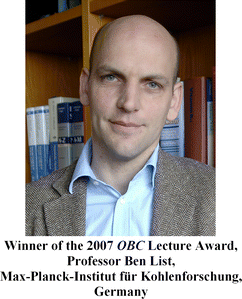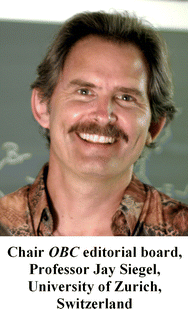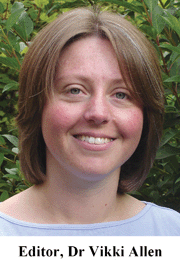Happy New Year to all Organic & Biomolecular Chemistry reviewers, authors and readers
We are pleased to report that authors and readers alike agree that 2007 was a very successful year for Organic & Biomolecular Chemistry (OBC). The editorial board and team are committed to maintaining this success throughout the coming year to ensure that OBC remains a great quality journal.For our readers in 2008, OBC will continue to publish some of the best, most topical research articles in the field. You as an author can rely on our excellent independent peer-review and rapid production services to make coming back to OBC a priority for your research program.
Pleasingly, the ISI® impact factor—a mark of a journal's prominence—for OBC showed a notable 12.5% rise (2.87), moving OBC up the ranks within organic chemistry.
Starting the year knowing left from right
Once again for 2008, we begin the New Year by bringing you a great selection of articles. This issue contains an Emerging Area article by Bruce Lipshutz (T. A. Butler, E. C. Swift and B. H. Lipshutz, Org. Biomol. Chem., 2008, 6, 19–25) entitled ‘Heterogeneous catalysis with nickel-on-graphite (Ni/Cg)’ and two Perspective articles.The Perspective by John Baldwin (J. E. Baldwin and P. A. Leber, Org. Biomol. Chem., 2008, 6, 36–47) focuses on molecular rearrangements through thermal [1,3] carbon shifts. The other Perspective by Masahiko Yamaguchi (R. Amemiya and M. Yamaguchi, Org. Biomol. Chem., 2008, 6, 26–35) describes chiral recognition in noncovalent bonding interactions between helicenes and outlines why a right-handed helix favours a right-handed helix over a left-handed helix. In addition, this issue also contains a paper by Jason Micklefield (R. J. Worthington, N. M. Bell, R. Wong and J. Micklefield, Org. Biomol. Chem., 2008, 6, 92–103) that describes his research group’s latest work on pyrrolidine-amide oligonucleotide mimics.
This year sees the retirement of three editorial board members who have been involved in the development and success of OBC since inception. Thank you to Professor Thomas Carell, Ludwig-Maximilians-Universität München, Germany, Professor Karl Anker Jørgensen, Aarhus University, Denmark and Professor Itamar Willner, The Hebrew University of Jerusalem, Israel. Special thanks are extended to Itamar, who coordinated a themed issue for OBC on DNA-based nanoarchitectures and nanomachines in late 2006.
Celebrating success
Last year OBC marked the start of its fifth year of publication and this was celebrated with a number of events throughout the year. Celebrations kicked off with a ‘cookies and cake’ afternoon at the 233rd ACS National Meeting in Chicago, US in March followed by a full reception at the International Symposium: Synthesis in Organic Chemistry in Cambridge, UK in July.The conference in Cambridge also provided the venue for the 2007 OBC Lecture Award. Congratulations to the recipient Professor Ben List, Max-Planck-Institut für Kohlenforschung, Germany, who presented his winning lecture entitled ‘New strategies for organocatalysis’ at the conference. In his presentation, List highlighted the latest advancements, including asymmetric counter-ion directed catalysis for the highly enantioselective epoxidation of enals.
Although he has made huge progress in recent years, as reviewed in his Emerging Area article in OBC, List believes there is still great scope for development. ‘Developing active catalysts is the next challenge for chemists interested in organocatalysis,’ he said.
Nominations for the 2008 OBC Lecture Award are now closed and the results will be announced early this year.
Throughout 2007 the editorial team attended 14 conferences worldwide with the journal being represented alongside the editorial board at numerous other prestigious meetings and institutional visits. The team will be undertaking a busy travel programme during 2008, so we hope to meet many of you in the coming year.
Award-winning technology and enhanced HTML articles
Launched in February 2007, RSC Project Prospect has had an exceptional first year. Bringing science alive via enhanced HTML articles in RSC Journals, the project delivers: hyperlinked compound information (including downloadable structures) in text; links to IUPAC Gold Book terms; ontology terms linked to definitions and related articles; plus RSS feeds that include structured subject and compound information, enabling at-a-glance identification of relevant articles.As the only publisher able to offer these enhancements, we were delighted to be awarded the 2007 ALPSP/Charlesworth Award for Publishing Innovation, where judges described RSC Prospect articles as ‘delightfully simple to use … benefits to authors and readers are immediately obvious’. Around 1400 articles have now been published with enhanced HTML—to see for yourself, look out for the RSC Prospect icon on our website. Further developments to the project will be announced in 2008. Many of you have already told us how impressed you are with the project: www.projectprospect.org has examples of enhanced articles, feedback from the scientific community, plus the latest news.
Changing the face of science
Following feedback from journal readers, a number of changes have been introduced across all RSC Journals. The Organic & Biomolecular Chemistry homepage now contains the contents list for the current issue, delivering the content you want to see as soon as you arrive at the site. Graphical abstracts are included as standard, allowing you to browse content much more conveniently. A more prominent and easy-to-use search box also makes finding published research much more intuitive. Advance Articles will soon also be available in PDF format.For authors, the RSC Journal templates have been revised and updated to assist submission in a format similar to the journal layout. The guidelines for the use of colour in RSC Journals will be relaxed during 2008, and the decision on the free use of colour will be based on whether the use of colour enhances the scientific understanding of the figure (the old policy required the colour to be essential). In addition, for the online version of the journals, colour will be introduced at no cost in both the PDF and HTML versions.
Energy & Environmental Science
RSC Publishing will be launching a new journal in summer 2008. Energy & Environmental Science will cover all aspects of the chemical sciences relating to energy conversion and storage and environmental science. Visit the website for the latest news: www.rsc.org/eesMolecular BioSystems spin out
It's official, Molecular BioSystems has separated from host journal, Chemical Communications, and is now a fully fledged solo publication. Its availability since launch to readers of Chemical Communications and the online hosts, Organic & Biomolecular Chemistry, Lab on a Chip, The Analyst and Analytical Abstracts has ensured that Molecular BioSystems received a large and interdisciplinary audience from the outset. OBC readers wishing to continue to read Molecular BioSystems now need to recommend the journal to their librarian. Fill in the online recommendation form at www.rsc.org/libraryrecommendation‘Organic & Biomolecular Chemistry book of choice’ scheme
Launched in Spring 2007, the RSC eBook Collection offers scientists across the globe online access to a prestigious and wide-ranging portfolio of chemical science books that span 40 years of research and opinion.The RSC eBook Collection is testament to the RSC's publishing innovation as well as the high quality of the content contained in our books. With further technical developments and new 2008 content being uploaded throughout the year, the RSC eBook Collection is set to become a key resource. To search the collection or for further information, visit www.rsc.org/ebooks
Scientists worldwide are taking advantage of the free first chapter downloads and from January 2008, OBC will regularly highlight a book specifically for our readers through our ‘Organic & Biomolecular Chemistry book of choice’ scheme.
25% Book discount for RSC authors, editors and reviewers
If you would like to buy a print copy of the ‘Organic & Biomolecular Chemistry book of choice’ or other titles from the RSC, and you are an RSC author, editor or reviewer, you can enjoy a special 25% discount on your book purchase. You can redeem this offer online through the RSC Online Shop. To find out how to claim your exclusive discount, visit www.rsc.org/shopAs you can see, the RSC remains committed to providing great service and benefits to all its journals readers and authors.
We thank all of our authors, reviewers and readers for their continued support. On behalf of the editorial board and the Organic & Biomolecular Chemistry team at the RSC, we wish all of you a very happy and successful 2008.
| This journal is © The Royal Society of Chemistry 2008 |



